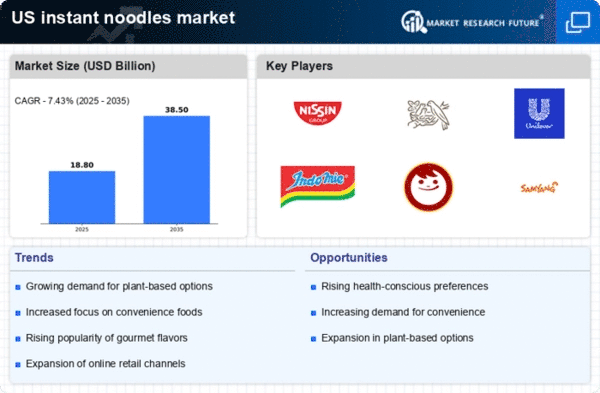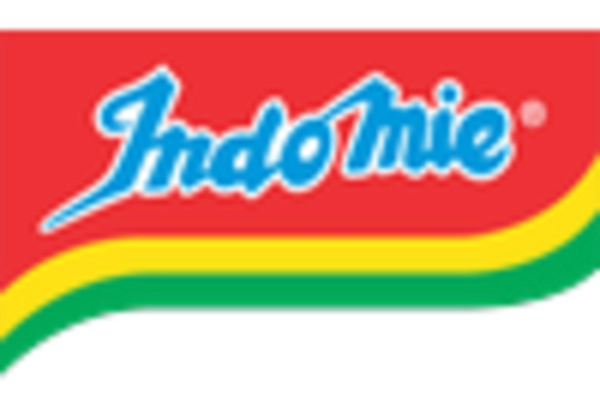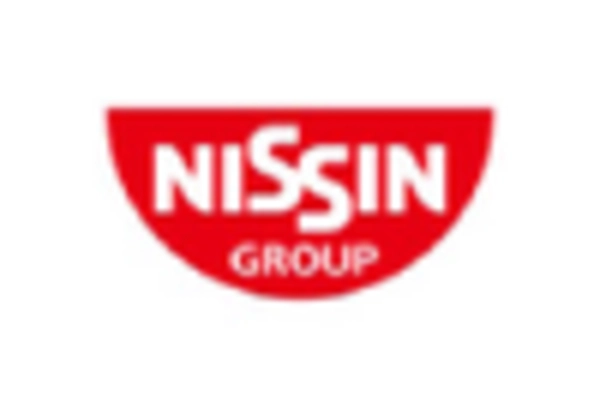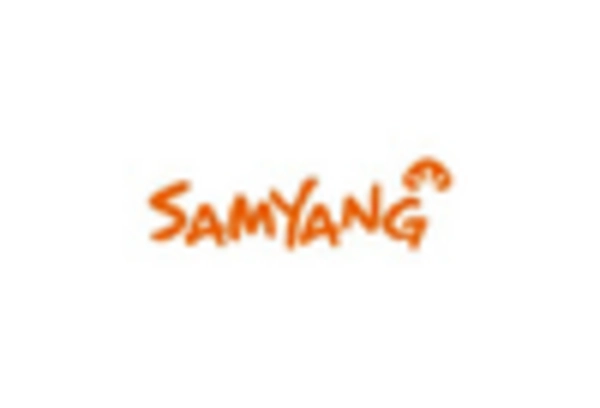Rising Snacking Culture
The instant noodles market is experiencing growth due to the rising trend of snacking, particularly among younger demographics. As consumers increasingly view snacking as a legitimate meal option, instant noodles are being embraced as a quick and satisfying snack. This shift is evident in Market Research Future, which shows that nearly 30% of consumers in the US consider instant noodles a convenient snack choice. The versatility of instant noodles allows them to be consumed at any time of the day, further solidifying their position in the snacking category. As this trend continues, the instant noodles market is likely to adapt by introducing smaller portion sizes and innovative flavors that cater to snackers.
Diverse Consumer Preferences
The instant noodles market is characterized by a wide array of flavors and varieties, catering to diverse consumer preferences. As the US population becomes increasingly multicultural, there is a growing demand for products that reflect various culinary traditions. Instant noodles manufacturers are responding by introducing flavors inspired by different cuisines, such as Asian, Italian, and Mexican. This trend is supported by market data indicating that flavor variety can significantly influence purchasing decisions, with 45% of consumers expressing a preference for unique and exotic flavors. By expanding their product lines to include diverse options, companies in the instant noodles market can attract a broader customer base and enhance their competitive edge.
Convenience and Time Efficiency
The instant noodles market benefits from the increasing demand for convenience foods, particularly among busy consumers. As lifestyles become more fast-paced, individuals seek quick meal solutions that require minimal preparation time. Instant noodles, which can be prepared in just a few minutes, align perfectly with this trend. According to recent data, approximately 60% of consumers in the US prioritize convenience when selecting food products. This shift towards convenience is driving growth in the instant noodles market, as more people opt for ready-to-eat meals that fit their hectic schedules. The industry is likely to continue expanding as manufacturers innovate to enhance the convenience factor, potentially introducing new packaging and preparation methods that cater to the on-the-go consumer.
Affordability and Economic Factors
Affordability plays a crucial role in the instant noodles market, particularly in the context of economic fluctuations. With rising food prices, consumers are increasingly looking for budget-friendly meal options. Instant noodles are often priced lower than many other meal alternatives, making them an attractive choice for cost-conscious shoppers. Recent statistics indicate that the average price of a single serving of instant noodles is around $0.50, significantly lower than many other prepared meals. This affordability factor is particularly appealing to students and low-income families, who may prioritize cost over other factors. As economic conditions evolve, the instant noodles market is expected to thrive, as consumers continue to seek value in their food purchases.
E-commerce Growth and Online Availability
The instant noodles market is benefiting from the rapid growth of e-commerce, which has transformed the way consumers shop for food products. With the increasing popularity of online grocery shopping, instant noodles are more accessible than ever. Data suggests that online sales of instant noodles have surged by over 25% in the past year, as consumers appreciate the convenience of ordering their favorite products from home. This trend is particularly pronounced among younger consumers, who are more inclined to purchase food items online. As e-commerce continues to expand, the instant noodles market is expected to see further growth, as companies enhance their online presence and offer promotions to attract digital shoppers.

















